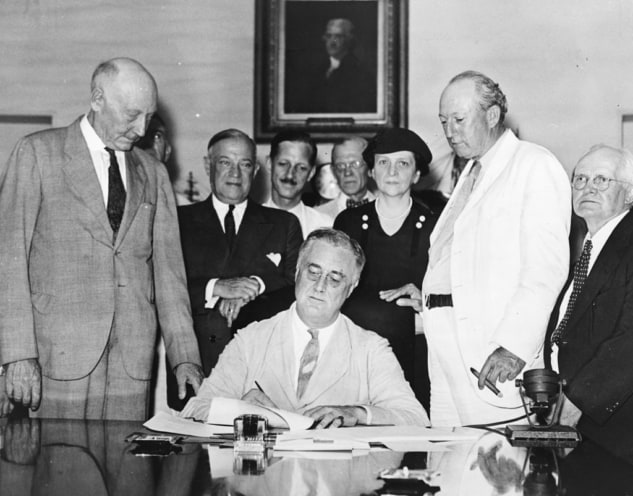Trump Payroll Tax Cut is First Shot in War Against Social Security
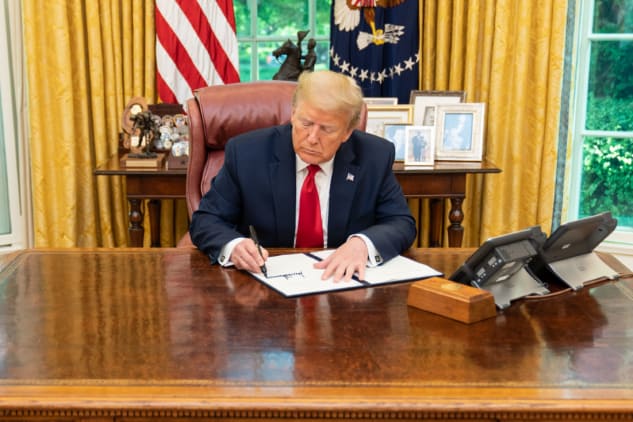


Whether or not President Trump understands the dangerous implications of “terminating payroll taxes,” his executive order on Saturday and accompanying remarks should alarm all Americans. The President’s exercising unilateral authority (of dubious legality) to cut the payroll taxes which fund Social Security proves that opponents of workers’ earned benefits have his ear. Earlier this month, conservative commentator and longtime antagonist of Social Security Stephen Moore implored the President to bypass Congress and order the I.R.S. to impose a “payroll tax holiday.” That’s exactly what the President’s executive order does. And that’s exactly what many on the right want: a back-door method to destroy Social Security under the guise of a “tax cut.”
“Beyond the attack on crucial earned benefits, this action does nothing to help unemployed and retired Americans survive this unprecedented crisis. Instead, the President is focused on undermining their financial security… This decree is a poorly disguised first step in an effort to fully dismantle this vital program by executive fiat.” – Rep. Richard Neal, Chairman of House Ways & Means Committee, 8/9/20
Simply put, the President’s action is a blatant betrayal of his promises “not to touch” Social Security. Rescinding workers’ payroll contributions – even temporarily – is harmful to Social Security, since the program’s funding depends on those taxes. But the President’s pronouncement that if re-elected he would “terminate FICA taxes” is even more chilling. No supporter of Social Security would permanently “terminate” the taxes that it relies on for funding, especially at a time when the program faces financial challenges that require more revenue, not less. Surrounding himself with “entitlement reformers” who want to cut, privatize, and obliterate the program – and then acting on their advice – is a strange way of honoring those promises.
His opponent, Joe Biden, wasted no time calling the President’s action what it is – “the first shot in a reckless war on Social Security.”
“He is putting Social Security at grave risk at a time when seniors are suffering the overwhelming impact of a pandemic he failed to control. Our seniors are under enough stress without Trump putting their hard-earned benefits in doubt.” – Joe Biden, 8/8/20
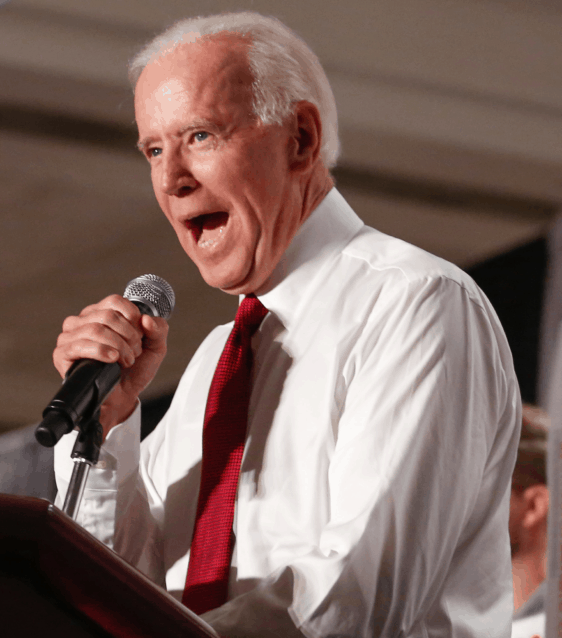


Trump’s executive order is also an election-year ploy to offer financially struggling Americans fake relief during the COVID pandemic. Democrats and many Republicans in Congress opposed a payroll tax cut because it is an ineffective means of stimulus (and risky for Social Security), so the President simply did an end-run around them that may not even be legal. House Democratic leader Nancy Pelosi called the order “absurdly unconstitutional” and Republican Senator Ben Sasse labeled it “unconstitutional slop.”
So here we have an executive order that is an insidious attack on Social Security and likely unconstitutional, but also will not deliver the economic stimulus that the president promises, as senior contributor Rob Berger points out in Forbes.
“Experts seem to universally agree that a payroll tax holiday isn’t the type of relief we need. For starters, it does nothing for the unemployed. It only helps those with a job. It also doesn’t help those out of the workforce, such as retirees or stay-at-home parents. And the benefit is spread out over four months, rather than given to those in need of immediate relief.” – Rob Berger, Forbes, 8/9/20
Like many of his other executive orders and actions as President in general, Trump’s payroll tax cut is another con. He postures as a populist while doing the bidding of the corporate class, which has opposed Social Security from the very beginning. Any president who promises to “terminate” the funding source for America’s most popular and successful social insurance program if re-elected… deserves not to be.
Moore’s Payroll Tax Proposal Means Less Security for American Seniors
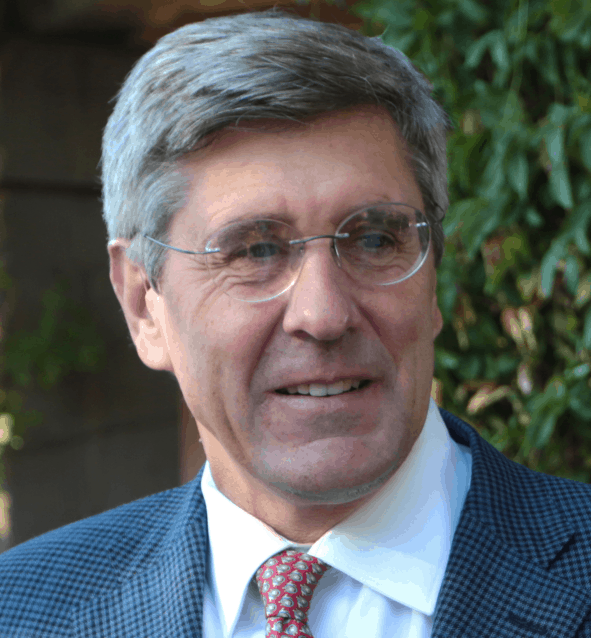


In an August 2nd op-ed in the Wall Street Journal, conservative commentator (and former Federal Reserve Board nominee) Stephen Moore urged President Trump to circumvent Congress and impose a payroll tax cut unilaterally.
“The president needs to pull an end run, and there’s a legal way to do that. He should declare a national economic emergency and announce that the Internal Revenue Service will immediately stop collecting the payroll tax.” – Stephen Moore, Wall Street Journal, 8/2/20
Moore is undaunted by the fact that both parties in Congress rejected payroll tax cuts out of hand as part of the next Coronavirus relief package. But the President has been like a dog with a bone — insisting that the taxes that fund Social Security be cut or eliminated — and so has Moore.
This intransigence is completely unwarranted. Economists have said that a payroll tax cut is an ineffective means of economic stimulus. Contrary to the President’s claims, it will not entice employers to hire or re-hire workers. Payroll tax cuts inordinately benefit higher-earners and not the lower-income workers who need the most relief. Worse yet, of course, constricting or cutting off Social Security’s funding stream imperils seniors’ earned benefits – at a time when the program needs more, not less, revenue.
Moore argues that, to protect benefits, President Trump “should order Treasury to put bonds into the Social Security” trust fund. This is a fancy way of saying that the government should substitute general revenue for workers’ payroll contributions, which would undermine the “earned benefit” nature of Social Security – and open up the program to fresh attacks for supposedly increasing federal deficits.
“It is difficult to fathom a worse moment to weaken (Social Security) than during a pandemic and crushing economic recession. While Republicans have long sought to gut these earned benefits, doubling down on those efforts while the COVID crisis rages on would be particularly heartless.” – Rep. John Larson and Rep. Richard Neal, 8/3/20
If payroll tax cuts make little economic sense, then why do conservatives like Moore continue to agitate for them? It could be that Moore and his compatriots on the right have always opposed Social Security at its core – and are anxious to find a back door means to dismantle it. Moore is on temporary leave as a Visiting Fellow at the conservative Heritage Foundation, and currently heads an advocacy group called Unleash Prosperity. The Heritage Foundation was founded with funding from ultraconservative beer baron Joseph Coors, principally to attack New Deal and Great Society programs.
Backed by wealthy and powerful donors, groups like the Heritage Foundation believe in completely unfettered capitalism, and oppose government programs to lift – and keep – society’s most vulnerable members out of poverty. Former Heritage Foundation president Edward Fuelner once called these programs “an assault on founding principles articulated in the 18th century.” Social Security was the landmark program of the New Deal, and as such has been a favorite target of the Heritage Foundation and Stephen Moore in particular. In 1995, Moore attacked the program’s very existence, calling it “a Ponzi scheme that we are all paying for.”
“We’ve probably gone too far in providing the safety net for the elderly. To a large extent, we’ve started a system in this country where we are taxing struggling middle-class families that are young to provide lavish government benefits for people over 65.” – Stephen Moore, C-SPAN, 1995
Never mind that many middle-class families depend on Social Security when their breadwinners retire, become disabled, or pass away. Only a person of financial privilege would consider Social Security’s average $1,500 monthly benefit “lavish.” At that level, the average beneficiary receives $18,000 a year – only a few thousand dollars above the federal poverty line. Seniors face rising costs for basics like groceries, housing, and health care – while their cost-of-living adjustments are often inadequate to keep up with inflation. Yet, nearly half of retirees depend on Social Security for all or most of their income.
Social Security’s opponents cloak their agenda in proposals like payroll tax cuts because they know how popular the program is with the public. Poll after poll indicates that Americans support Social Security and do not want to see the program cut or compromised. In a recent survey of the National Committee to Preserve Social Security’s membership, 96% of respondents said they oppose using Social Security for unrelated purposes, while 88% specifically rejected the president’s payroll tax proposal.
Workers’ payroll contributions are the heart of the Social Security program. That’s what makes it an “earned benefit.” President Franklin Roosevelt realized this after he signed Social Security into law, famously saying that because workers contribute to their retirement benefits, “no damn politician” would ever be able to scrap the program. Social Security has provided American seniors with basic financial security for generations. (The program’s 85th anniversary is August 14th.)
Moore, the Heritage Foundation and other conservative groups who believe the government has no role in keeping seniors out of poverty want to undo the crowning achievement of the New Deal – even if they don’t always say so out loud. Seniors and their advocates must not let them get away with it.
Let’s Protect & Expand Medicare and Medicaid as They Turn 55



President Johnson signs Medicare and Medicaid into law on July 30, 1965
On this 55th anniversary of Medicare and Medicaid, not only are both programs succeeding in fulfilling their original missions, they have adapted to the health care challenges of the past five decades and proven themselves anew during the unprecedented COVID crisis. Medicare is saving seniors’ lives by providing affordable, accessible care in the face of a disease that has hit older Americans particularly hard. Medicaid continues to provide this nation’s only dependable long-term care program – while its expansion under the Affordable Care Act covers vulnerable, lower-income Americans, many of whom have lost health coverage during the pandemic.
President Lyndon B. Johnson signed Medicare and Medicaid into law on July 30, 1965. Of the new Medicare program, he promised, ‘No longer will illness crush and destroy the savings that (older Americans) have so carefully put away over a lifetime so that they might enjoy dignity in their later years.’ While that promise has been met, both programs are at a critical pivot point in history.
There is a movement in Congress to expand both programs to meet the diverse and growing needs of seniors and lower-income Americans. The National Committee to Preserve Social Security and Medicare supports the House-passed bill (H.R. 3) that would add limited hearing, dental, and vision coverage to traditional Medicare. Medicare must be allowed to negotiate prices with drug-makers (as authorized by H.R. 3). This is the single most effective remedy for the price gouging that afflicts seniors and all Americans. We support the Affordable Care Act, which improved Medicare benefits and helped extend the program’s solvency – and provided for the expansion of Medicaid to cover millions of the uninsured.
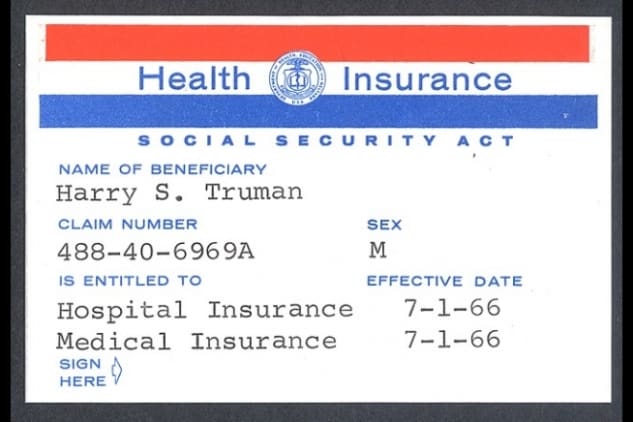


Former President Harry Truman received the first Medicare card
Unfortunately, President Trump and some of his allies in Congress are attempting to undermine both programs. Despite promising ‘not to touch’ either one, the president has called for more than $1.5 trillion in cuts over ten years to Medicare and Medicaid. His administration has tilted the playing field toward private Medicare Advantage plans, which restrict patients’ choice of doctors and have been flagged for overbilling taxpayers. The President wants the Supreme Court to strike down the Affordable Care Act (in the middle of a pandemic, no less), which would strip more than 20 million Americans of health care and reverse the law’s improvements to Medicare and Medicaid.
These attempts to dismantle health care programs that safeguard seniors, people with disabilities, and lower-income Americans makes today’s anniversary a bittersweet occasion. As we mark the decades of Medicare and Medicaid’s significance, we must continue to fight to protect and expand them in the face of attacks from their opponents. The 2020 elections present an opportunity to choose a president, senators and representatives who will champion the programs that give our citizens the quality health care and dignity they have earned and deserve.
Trump Prescription Drug Pricing Orders Too Limited, Too Late
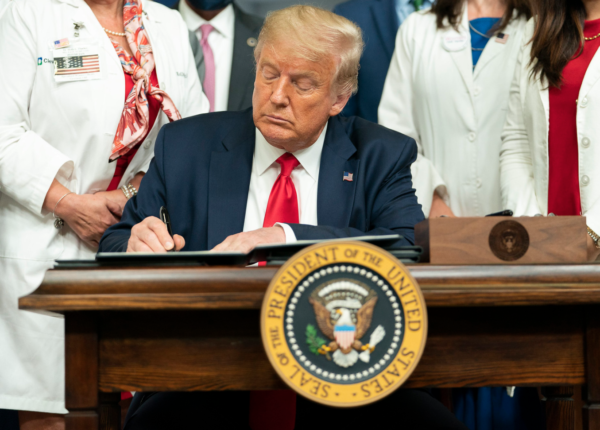


The rhetoric President Trump used in unveiling a set of new executive orders on prescription drug pricing could not have been more bloated, nor the substance of those measures so skimpy. On Friday, the president proclaimed in dramatic fashion that the four “bold and historic” executive orders would be of “help for our great seniors,” achieve things “nobody thought could be done” and result in “massive reductions” to prescription drug prices.
That it took almost four years for the president to issue a set of orders addressing one of his highest campaign priorities in 2016 is suspect in and of itself. They were unveiled in the midst of a pandemic that has disproportionately imperiled seniors as Trump’s poll numbers with the crucial 65+ voting bloc are plummeting. It is hard not view these late-coming executive orders as a ploy to win back some of the senior vote rather than as a set of serious policy proposals.
Politico reported this weekend that the president’s orders are “rife with limitations,” despite his inflated rhetoric:
“The orders are not immediately enforceable. Health officials have been working on ways to implement some of the proposals — namely guidelines for states to implement importation plans. But it’s is unlikely that any could be finalized before the November presidential election…” – Politico, 7/24/20
Clearly, if the President wanted “bold” action on prescription drugs, he would have backed H.R. 3, The Elijah Cummings Lower Drug Costs Now Act, which allows the Medicare program to negotiate drug prices directly with Big Pharma. Not only did the president not embrace this legislation, he did not include Medicare price negotiation – the single most effective solution to the price gouging that affects so many of our seniors – in his executive orders.
“Any proposal that doesn’t include Medicare price negotiation can’t be taken seriously, because any serious policy effort must include it to address the underlying problem of price gouging.” – Max Richtman, president and CEO of the National Committee, 7/24/20
If he were serious about reducing prescription prices, the president could have pushed the GOP-controlled Senate to pass the Grassley-Wyden bill, which does not include price negotiation but represents a solid step toward controlling drug costs through inflation-indexing. Besides offering some tepid support for the bill, the president never agitated for its passage, instead claiming that he has been “waiting for Congress” to take action.
Price Caps
The first executive order would revive a long-standing proposal to link what Medicare pays for prescription drugs to the prices in other countries, which sounds like a sweeping action on face. But the order won’t go into effect immediately (if ever), because the order includes an escape clause for Big Pharma to come up with an alternative of its own.
Rebates
The second order would eliminate the rebates that pharmaceutical companies pay to insurance companies – which Stat News refers to as a “previously abandoned” plan.” The catch here is that the order would not kick-in if it affects insurance premiums.
Drug Importation
The third order instructs the Department of Health and Human Services to facilitate “grants to individuals of waivers of the prohibition of importation of prescription drugs,” meaning that individual Americans (not the federal government) could buy drugs from Canada and other countries.
Insulin and Epi-pens
The fourth order requires federal community health centers to pass discounts for insulin and epi-pens directly to patients. As Politico reports, the order only applies to approximately 1,000 community health centers nationwide, “not to hospitals that are frequently flagged as diverting the discounts away from patients toward other programs.”
Hitting Big Pharma with a Feather
The executive orders are consistent with the administration’s overall approach to soaring prescription drug prices, which has been piecemeal at best, disingenuous at worst. (Some of the president’s previous actions have been tossed out by the courts, others postponed or abandoned.) The president may talk tough about taking on Big Pharma, but his executive orders seem designed to strike the industry with the force of a feather.
Hardly “revolutionary” or “historic,” the latest executive orders “direct his administration to begin the normal, notoriously slow regulatory processes needed to reform the existing system,” Stat News observes.
National Committee president Max Richtman says that “seniors suffering from soaring prescription prices will not be fooled by grandiose pronouncements at a press conference that appear to be a ‘Hail Mary’ pass during an election year.”
Like previous Trump administration actions on this issue, the latest round of executive orders are too little, too late, and too weak to remedy the scourge of prescription price gouging.



